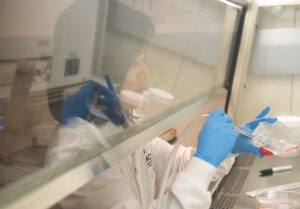OICR is supporting eight studies from across Ontario through its Clinical Translation Pathway, which advances new cancer discoveries so they can benefit patients.
August 14, 2024, TORONTO — A new round of awards from the Ontario Institute for Cancer Research (OICR) will jumpstart eight promising studies that could change how cancers are diagnosed and treated.
OICR announced the results of its Pre-Clinical Acceleration Team Awards — part of the Institute’s Clinical Translational Pathway, which helps advance new discoveries so they can benefit people affected by cancer.
The winning research teams are based across Ontario and are tackling some of the most common and hardest to treat cancers. They are developing solutions to find cancer earlier, diagnose it more accurately, and treat it more effectively with fewer side effects, with the ultimate goal of bringing these solutions to the healthcare system.
In total, OICR is providing nearly $6 million over three years to support these studies:
- Dr. Madhuri Koti of Queen’s University is aiming to develop a personalized approach to treat early-stage bladder cancer, a disease which is becoming increasingly common in Canada. Koti and the team will explore ways to identify patients who will not respond to ‘BCG immunotherapy’ — the standard-of-care treatment for non-muscle invasive bladder cancer — so they can be treated with other, more effective approaches.
“With the incidence of bladder cancer continuing to rise, our biomarker-guided approach could have a major impact on improving patient quality of life.” – Dr. Madhuri Koti, Associate Professor of Biomedical and Molecular Sciences, Cancer Research Institute, Queen’s University - Dr. Neil Fleshner of the University Health Network is investigating a diabetes medication (Metformin) that has shown promise in slowing the progression of prostate cancer. Fleshner’s team will look into how the drug works at a molecular level to better understand what makes it effective, and see if it can be harnessed to treat patients with early stage prostate cancer.“
The findings from our study can be integrated into the clinic to ensure that patients with early stage prostate cancer get the right treatment at the right time.” – Dr. Neil Fleshner, Clinician Scientist, Princess Margaret Cancer Centre, University Health Network - Dr. David Uehling of the Ontario Institute for Cancer Research and Dr. Neil Vasdev of the Centre for Addiction and Mental Health (CAMH) are exploring a potential targeted therapy for a rare and deadly pediatric brain cancer called diffuse intrinsic pontine glioma (DIPG). They will use innovative ‘radiotracers’ to monitor the distribution and impact of their drug candidate in mice and determine how it can be optimized to treat patients with DIPG.
“We aim to develop a high-quality therapy that can bring hope to young people facing this terrible disease, and to their families.” – Dr. David Uehling, Scientific Lead, Therapeutic Innovation and Drug Discovery, Ontario Institute for Cancer Research - Dr. Richard Kim of Lawson Health Research Institute (London Health Sciences Centre) is aiming to reduce the side effects of medicines called ‘kinase inhibitors’, which are effective at treating multiple types of cancers. Kim and colleagues will look for biological clues to predict which patients will benefit most from kinase inhibitors and which patients will experience severe side effects, so patients can be treated with personalized strategies.
“Our innovative approach has the potential to reduce adverse effects while ensuring that patients still get the benefits of this exciting class of cancer therapies.” – Dr. Richard Kim, Wolfe Medical Research Chair in Pharmacogenomics, Lawson Health Research Institute (London Health Sciences Centre) - Dr. Gelareh Zadeh of the University Health Network is exploring a way to diagnose what type of brain cancer a patient has without having to take a biopsy of brain tissue. Zadeh and the team are developing a test that analyzes tiny fragments of tumour DNA in a blood sample and can help determine the type of tumour, predict how it will it evolve and point to the most effective treatment.
“We hope to develop a tool that can help diagnose brain tumours and determine the best course of treatment for a patient, without the stress and risk of a brain biopsy.” – Dr. Gelareh Zadeh, Senior Scientist, University Health Network - Dr. Geoffrey Wood of the University of Guelph is looking into a radically different approach to diagnosing osteosarcoma, the most common form of bone cancer in humans that is also prevalent in dogs. Wood will lead a team exploring whether a simple blood test that can predict the spread of osteosarcoma in pet dogs can be adapted to help detect and treat bone cancer earlier in humans.
“Having an easy-to-use blood test that can predict the spread of bone cancer could help treat osteosarcoma earlier and avoid harsh treatments for those who don’t need them.” – Dr. Geoffrey Wood, Professor and Co-Director, Institute for Comparative Cancer Investigation, University of Guelph - Dr. Kun Ping Lu of Western University is exploring new ways to diagnose and treat pancreatic cancer, one of the deadliest forms of the disease. Lu and colleagues discovered an enzyme that may drive the growth of pancreatic tumours and are using it to develop a test that could inform the best ways to treat these tumours. They also believe this enzyme could be a target for new cancer drugs in the future.
“Our discovery opens up many avenues to improve how pancreatic cancer is treated and we are excited for the impact it could have for patients.” – Dr. Kun Ping Lu, Professor of Biochemistry, Schulich School of Medicine & Dentistry, Western University - Dr. Karen Mossman of McMaster University is investigating a new cancer therapy – part of a family of treatments called ‘oncolytic viruses’ – she and her colleagues developed that has shown promise in treating pancreatic, lung and colorectal cancers with minimal side effects. They will look for biological clues that indicate which patients will respond to this new therapy and try and determine the optimal dose and best way to administer it.
“We hope our work will help people live longer with better quality of life during and after cancer treatment, and help more people in Canada access the best treatment options.” – Dr. Karen Mossman, Professor of Medicine, McMaster University
OICR President and Scientific Director Dr. Laszlo Radvanyi applauded the eight research teams for their pioneering work.
“OICR is excited to be supporting some of the best and brightest researchers in the province doing truly transformative science,” said Radvanyi. “We share their commitment to harnessing new innovations to improve the lives of people affected by cancer, and we hope these awards will put them on a pathway toward making a major impact.”
“Congratulations to the research teams receiving this OICR award. The research you are doing will positively impact the lives of many Ontarians in their fight against cancer,” said Jill Dunlop, Minister of Colleges and Universities. “Ontario is proud to support research teams like these for advancing discoveries that will help improve the prevention, detection and treatment of cancer.”
OICR is funded by the Government of Ontario. As the province’s cancer research institute, we take on the biggest challenges in cancer research and deliver real-world solutions to find cancer earlier and treat it more effectively. We are committed to helping people living with cancer, as well as future generations, live longer and healthier lives. For more information visit http://www.oicr.on.ca.
The views expressed are those of OICR and do not necessarily reflect the views of the Province of Ontario.


